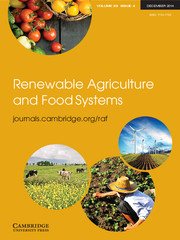Article contents
Improving resource-use-efficiency with no-till and crop diversity
Published online by Cambridge University Press: 06 June 2016
Abstract
Recently, we conducted a case study that showed a no-till, diverse cropping system increasing corn yields in a semiarid climate compared with a tilled, corn–soybean rotation. Further analysis showed that the no-till system improved resource-use-efficiency of corn; inputs were reduced 42% averaged across five resources. The largest reduction with inputs involved nitrogen fertilizer and fuel. Reduced fertilizer input was attributed to greater soil microbial activity. A surprising trend was that cost of weed management in corn was 45% lower in the no-till system, due to resistant weeds being present only in the tilled, corn–soybean system. Crop diversity in the no-till system suppressed development of weed resistance. Integrating a diversity of crops with no-till can improve efficient use of resources.
- Type
- Commentary
- Information
- Copyright
- Copyright © Cambridge University Press 2016
References
- 5
- Cited by



